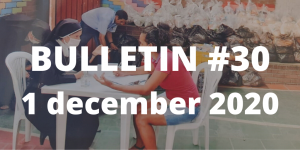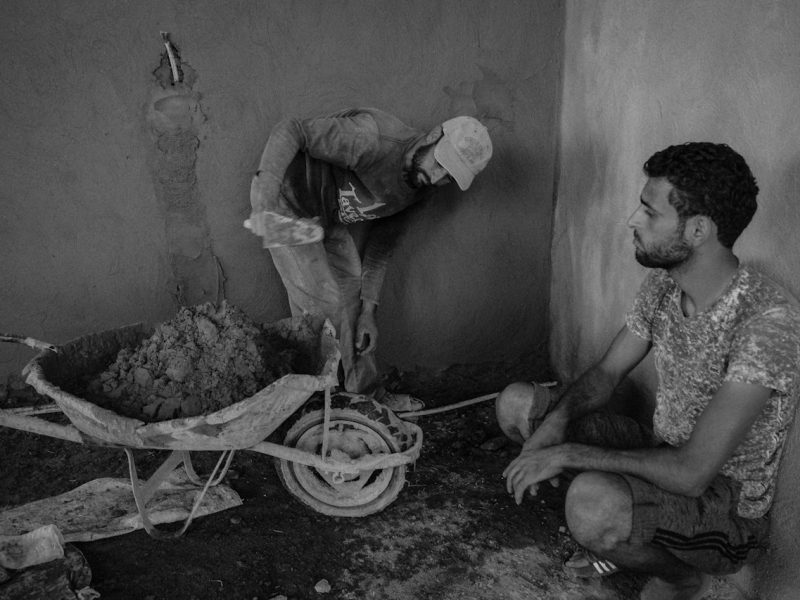

COVID-19 | BULLETIN #30 | 1 December 2020
“May the Lord restore our sight, so as to rediscover what it means
to be members of the human family” (Pope Francis)
New programmes despite the pandemic
The pandemic has put a strain on the humanitarian sector, demanding extraordinary human and economic measures. Nevertheless, Catholic humanitarian organisations have been launching new programmes to provide support to refugees and forcibly displaced people.
Caritas Internationalis has launched a three-year programme (FR) to assist Burundian refugees in the Mahama Camp in Rwanda. The programme is focused on helping women launch small businesses. By earning some money, the women of the camp can gain a measure of autonomy, regain their dignity and take care of their family, explained Ngarambe Vanson, a Caritas Rwanda member of the camp’s staff. The programme also provides tools and seeds for farming and assists the elderly. In addition, mediators have been trained to offer peacebuilding training within the camp and support people suffering from mental illnesses. The work of Caritas and the generosity of donors have helped displaced people improve the quality of their lives, even in these difficult times when their small businesses have been hard-hit due to the COVID pandemic.
ICMC, in partnership with the U.S. Department of State’s Bureau of Population, Refugees and Migration, launched a new programme for the year 2020/2021 in Jordan that provides vital humanitarian assistance to vulnerable and at-risk individuals in both refugee and host communities. ICMC in Jordan is strongly focussed on gender-based inequality and violence as well as child marriage. By building their resilience, life skills courses empower young women who are survivors and girls at risk of child marriage. Furthermore, the Catholic organisation continues running some of its regular activities such as its ‘Psychosocial and Mental Health Support’ services and its ‘Arabic and English Literacy’ classes. This year, ICMC has customized its ‘Child-Friendly Spaces’ to respond to children’s psychosocial needs through targeted activities designed to boost the resilience of some 4,500 children. Finally, through the livelihoods programme, participants benefit from vocational training, developing soft skills and boosting their employability. Each graduating student will leave the program with a tailored start-up kit containing essential materials to begin income-generating activities.
In Bangladesh, Caritas, Jesuit Refugee Service (JRS) and Catholic Relief Services (CRS) have joined hands in a new project to assist thousands of Rohingya refugees. The three Catholic agencies launched the ‘Multipurpose Adolescent Centre’ (ES) to promote the psychological development of children. It will also provide counselling and skills development to adolescents; childcare services; and care for expectant mothers and for children with special needs. The project, launched after a workshop in Cox’s Bazar in November 2020, will cover children aged 12-18 and run until April 2021 or be extended if need be. Inmanuel Chayan Biswas, head of operations of the Caritas Emergency Response Programme, explained that JRS funding for the project was mainly for protection sectors, whereas CRS provides support for disaster risk reduction, shelter and protection. CRS also provides technical and advisory support. In addition, according to Father Jerry Gomes, a Bangladeshi Jesuit who represents JRS in the country, JRS funds 11 child-friendly facilities that have already brought basic education to about 4,000 beneficiaries.
Speaking up for victims of humanitarian crises
As Pope Francis stressed several times, multiple crises afflict this wounded world and humanity; and if we want to get out of the pandemic better than before, it is necessary to address all the ills affecting our society. For this reason, it is important to keep raising awareness on the numerous humanitarian crises present worldwide, along with the pandemic emergency.
“We are truly in a deep humanitarian crisis and we need solidarity,” said Luiz Fernando Lisboa, Bishop of Pemba Diocese in Mozambique, in appealing for aid (IT; FR) for thousands of displaced families in Cabo Delgado. Many people have no documents and arrive with almost nothing. “There are a lot of people to be cared for and they need everything, but right now we are addressing the most basic needs, which is food and a place to stay,” he added, in the company of volunteers (including a team from Caritas Pemba) who welcome and offer help to the displaced persons. “It is a very difficult situation as there are still hundreds of them who sleep on the beach. They’ve been getting snacks, hot tea, but not real, solid food.” In addition, a trained team is following up with psychosocial support: “The Diocese of Pemba is training Priests, Sisters and lay pastoral workers in trauma counselling, so that they will be able to visit families and IDP (Internally Displaced Persons) centres to provide care.” Finally, Bishop Lisboa expressed his appreciation to individuals, organizations and groups that have been helping the displaced families in Cabo Delgado, thanking “all the people who have been concerned about our situation.”
“As spiritual leaders and pastors of God’s people and fellow citizens, we express our deep sadness for the recent war between brothers/sisters in our neighbouring country of Ethiopia,” the Bishops of Eritrea said in a statement (ES; IT; FR) on the conflict between the government of Addis Ababa and the regional authorities of the Ethiopian region of Tigray. “War is against life and against development.” Therefore, the Bishops call for peace and dialogue: “In the name of God and for the good of the peoples involved, we ask for an immediate cessation of hostilities.” Meanwhile, Abba Mussie Zerai, a priest of the eparchy of Asmara who has long campaigned for the protection of migrants, asked for a legal status that might protect Eritrean refugees in Tigray. As he explained to Agenzia Fides (IT; ES; FR), there are thousands of Eritreans in Tigray who are often hungry and exposed to all forms of exploitation and abuse. Despair intensifies and drives these people into the hands of human traffickers. Abba Mussie called on the European Union to “invest resources in order to ensure that these Eritrean refugees are welcomed in Ethiopia in a dignified manner and to guarantee access to the right of asylum, education, and medical care and work. … This is the best way to help and welcome refugees. Otherwise, the exodus to Europe will increase the sad number of deaths in the desert and on the Mediterranean Sea”.
Bishops José Mazuelos and Bernardo Álvarez have published a Pastoral Letter entitled: ‘Listening to the echo of Lampedusa in the Canary Islands’ (ES). The four sections of their Letter touch on the tragedy of immigrants; the globalization of indifference; called to be Good Samaritans; and brothers and sisters all. The authors reiterate the four verbs that summarize programs animated by the parable of the Good Samaritan, namely: to welcome, to protect, to promote and to integrate. “Where many see an emigrant, the Christian sees a brother or sister with a life marked by pain and suffering who seeks hope for a better life. We must not forget that, only when the current injustices and humanitarian crises cease, will we be able to regulate migratory flows. In addition, unnecessary migration must be avoided by creating real opportunities for decent living in the countries of origin. Until then, it is necessary to increase and simplify the granting of visas; open humanitarian corridors; ensure housing, security and essential services; offer employment and training opportunities; promote family reunification; protect minors; guarantee religious freedom and promote social inclusion,” reads the document. Faced with the arrival of thousands of immigrants in the Canary Islands, the local bishops invite the Catholic faithful and society in general to become aware of the poverty and vulnerability of these people. Everyone ought to ensure that no one feels marginalized or despised, but that all experience the welcome, attention and respect that they deserve as human beings.
Voices from the Church
In a 25 September video message to the 75th Session of the General Assembly of the United Nations, Pope Francis calls for reforms, multilateralism, cooperation and respect for human dignity. He also expresses the Holy See’s desire that the UN serve “as a sign of unity between States and an instrument of service to the entire human family.” The Holy Father points out that a “gross lack of respect for human dignity” underlies what he calls ‘the culture of waste.’ He cites instances of religious persecution, humanitarian crises, the use of weapons of mass destruction, internal displacement, human trafficking and forced labour, and the “great numbers of people being forced to leave their homes”—all of these are “intolerable, yet intentionally ignored by many.” The Pope goes on to highlight the devastating effects of the COVID-19 crisis on children, including unaccompanied migrants and refugees, pointing out that instances of child abuse and violence have seen an increase. Finally, “We never emerge from a crisis just as we were,” the Holy Father insists. “We come out either better or worse.” At this critical juncture, “it is our duty to rethink the future of our common home and our common project” by strengthening multilateralism and cooperation between states.
In a message for the International Day for Peace (IT; ES; FR) on 21 September, Barani Edwardo Hiiboro Kussala, Bishop of Tombura-Yambio, joins the Holy Father “in his desire for peace, in his prayer for peace and in his work for peace for the world and even more for people in South Sudan.” To obtain peace, “we must first of all fall in love with God”, says Bp Hiiboro. Then, he continues, it is necessary to love human beings, “created by him in his image.” Bp. Hiiboro goes on to underline the evils of tribalism: “Regardless of being members of our different ethnic communities, we are all drawn to the fact that God created all of us in his image. Consequently, you cannot in the name of your tribe humiliate, deprive or oppress another tribe and other human beings. Therefore we are called by this common denominator, that God is our creator and all human beings are in His image, so we all have the right to respect and we all have the right to live together”.
Marie Dennis of Pax Christi International has been invited to join the COVID-19 Commission which is working on imagining the world after COVID. In an interview with Vatican News (IT; ES), she holds that the Church with its social teaching “can help generate and evaluate ideas that can shape a more just and sustainable future.” To her, COVID-19 is exposing the deep injustice and violence that leave too many people, communities and countries vastly more vulnerable than others. However, she believes that “the seeds of nonviolence are being planted by all those responding in any helpful way to the suffering caused by COVID-19. These seeds, if nourished and carefully tended, may give rise to a globalization of solidarity rooted in nonviolence that will promote a just and sustainable peace.” Marie Dennis affirms that the future will be determined by the quality, methodology and content of the education we offer to younger generations. In that regard, she points to the deep inequality of educational opportunity within and between many countries around the world and to how COVID-19 has worsened this inequality. “Moving money from military spending to education seems an obvious way to invest in a just, peaceful and sustainable future.” The Catholic Church has played a remarkable role in guaranteeing education among vulnerable and disadvantaged communities. “The contribution of Catholic schools to peace and well-being in divided communities and countries overwhelmed by violence can be immense,” she explained; “especially valuable are those schools where the curriculum includes a deep exploration of nonviolence as a way of life and an important tool for transforming conflict.”
Download the bulletin n°30:
 For earlier issues of this Bulletin, please visit migrants-refugees.va/c-19-bulletin
For earlier issues of this Bulletin, please visit migrants-refugees.va/c-19-bulletin
We invite you to share this newsletter freely and widely. Please send news to us of the initiatives and good practices you are involved in, so that we can pass on good examples which inspire hope in future newsletters.
If you would like this Bulletin sent directly to your e-mail address, please send a brief request to: media@migrants-refugees.org




